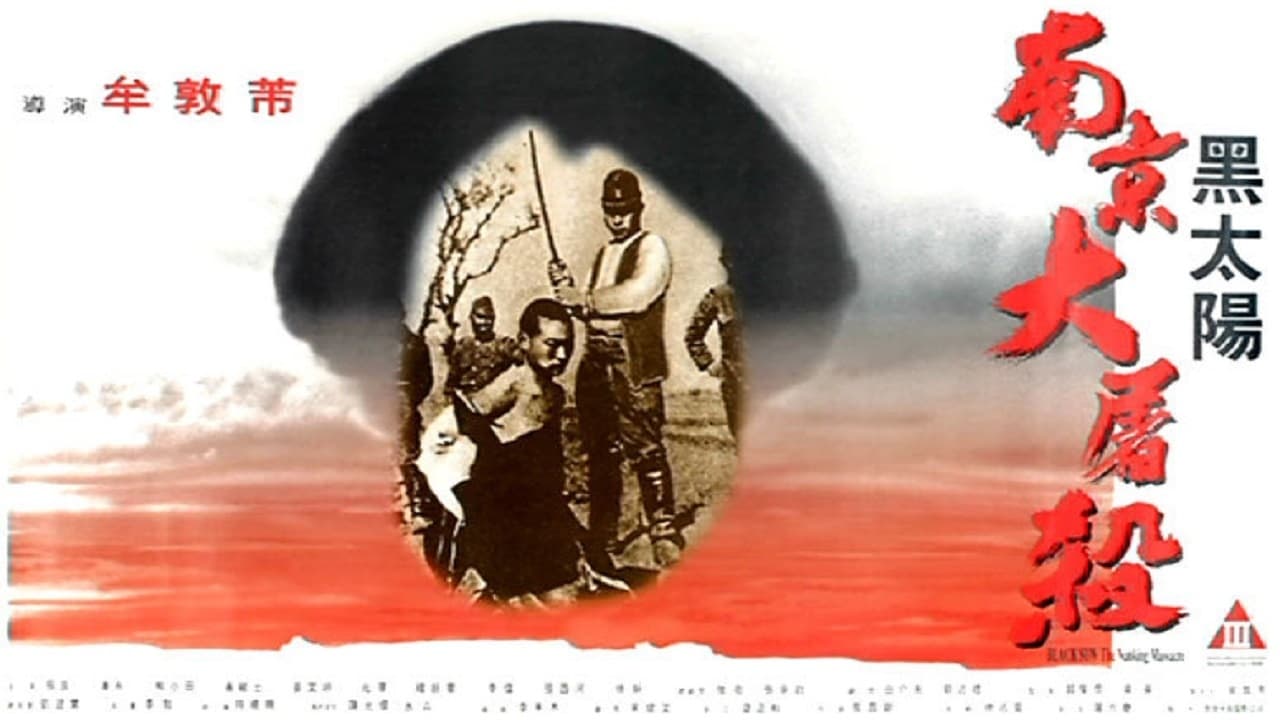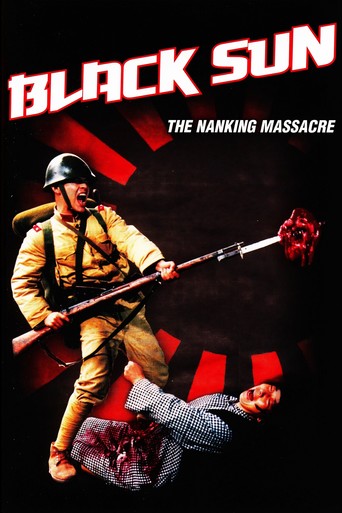

Far from Perfect, Far from Terrible
... View MoreFantastic!
... View MoreStory: It's very simple but honestly that is fine.
... View MoreThere's a more than satisfactory amount of boom-boom in the movie's trim running time.
... View MoreHonestly this movie is very, very upsetting. It's like going back into time, and watching old nightmares come back alive. It was powerful, raw, and just downright depressing. Few movies has made me felt so angry and emotional than this film. There was nothing good about it. It was a borderline snuff film. There are some exploitative gross out moments, like an unborn baby being pulled out of a pregnant woman's stomach via bayonette or scenes with children getting rape. The scene of hundreds of bodies being burned on the beach is truly haunting. Unlike films like 2009's City of War: The Story of John Rabe or 2007's Nanking that shows disturbing historic scenes, but also uplifting real life accents or stories of heroic figures trying to save them. This film is pure negatively exploitation with no linear storyline. Instead, the film has a small handful of overlapping vignettes detailing the horrors and atrocities inflicted on the citizens. There isn't any scene in the movie where you can rest from the amount of violence, gore, and disturbing imagery. You don't come out of watching the film feeling like there is any hope for mankind. You just feel sick in your stomach. Men Behind the Sun 4 or Black Sun: the Nanking Massacre is about the real life accents of what happen in 1937, when Japanese troops raid the Chinese city of Nanking to execute a planned massacre by subjecting over 300,000 helpless civilians to various tortures, rapes, and atrocities before slaughtering them all. The director's depiction of the Japanese is as heartless and soulless savages, while the Chinese are shown as meek and submissive is interesting to say. I think in real life, there had to be some Japanese soldiers that felt that what they were doing to the Chinese was wrong, and I doubt the Chinese would have been that submissive. There is only a few scenes of Chinese trying to fight back, while no scenes of Japanese soldiers questioning their actions. There is no clear main character in the film, as it follows the story of many men and women trying to survive. Too bad, none of them, survive that long to get the audience hook on them. The movie desensitizes the audience by not having a main character to root for. There is little or no any educational value behind seeing people die. The movie seems to follow step with Iris Chang's book, "The Rape of Nanking" and is, as far as I can see, historically accurate. I don't know how much exploitation it has for exploitation's sake. Still, It's very factual and very well filmed. The backdrop is so intricate, I can only imagine how much time and money went in to its production. Mixed with real film footage and photographs of the actual events, the film really shows the atrocities of war. The movie was directed Tun Fei Mou who known for disturbing movie such as 1988's "Man Behind the Sun". Don't worry, the Men Behind the Sun's Saga has nothing to do with each other, so you wouldn't miss anything if you don't watch the original or the Godfrey Ho's films "Man Behind the Sun 2: Laboratory of the Devil" and "Man Behind the Sun 3:Narrow Escape". There seems to be a few shots cut from the Hong Kong version against the U.S version. There is a Film tear 20 minutes in the film and another 41 minutes later. I heard that this was due to Chinese censorship, but I'm not for sure. It doesn't affect the movie U.S release version. The movie comes across as blatant anti-Japanese propaganda. Black Sun is not a documentary, and the emphasis is on shock rather than historical accuracy. Also, the connection between Black Sun to the rest of the exploitative "Men Behind the Sun" films doesn't help the film's credibility. Overall: Too much gore, lack of empathy to the characters portray in the film make this nothing, but an open wound between the relationship of Japan and China. This movie isn't no Chinese Schindler's List, there is void of no hope for anything good to come out of this film.
... View MoreHaving seen men Behind the Sun I guess I hoped for an evolution in style & technique to match the larger scale of this movie. I was also quite interested to see someone make a hard-hitting fact-based fictionalised account of what happened during this most notorious of Japanese atrocities, but this is not it. This plays like a bottom-to-mid tier European Nazi exploitation movie from the 70s - e.g. SS Experiment Camp etc (perhaps more like Deported Women of the Special Section actually). Granted it has a greater scope and more people running around, but it resorts to the same cheap and cheerless device of lots of hapless non-actors limply falling over to the sound of ridiculously fake gunshots, spiced up with the occasional poorly executed 'shock' sequence. The admittedly horrible documentary footage is roughly spliced in between scenes so hackneyed that even these real images are robbed of much of their power. Watch channel 4's 'The Holocaust' (aired recently (still running?), as of 1 No 2006) for a genuinely disturbing documentary on the evils of war (featuring excellent in-context use of actual footage). This is the type of treatment the horror of Nanjing deserves, not this hackneyed exploitation garbage (a better executed exploitation movie minus the disrespectful use of stock footage would have been fine, but again this is not even a very good exploitation movie). Rating: 3 (5 as exploitation, 1 as a treatment of the subject).
... View MoreBLACK SUN: THE NANKING MASSACRE (Hei Tai Yang: Nan Jing Da Tu Sha)Aspect ratio: 1.85:1Sound format: MonoDramatized account of events in 1937-38, when Japanese military forces overran the city of Nanking, unleashing a wave of barbarous cruelty on the defenceless population.Though hyped by its director as a sincere depiction of China's darkest hour, BLACK SUN: THE NANKING MASSACRE will be remembered chiefly for its exploitation trimmings, such as the scene in which a sneering Japanese soldier uses his bayonet to cut a foetus from the womb of a pregnant Chinese woman. It sounds horrific, but the incident is staged with freak-show explicitness more likely to generate laughter than horror - until one remembers that such things *did* happen during this period, and much worse besides...In narrative terms, the film offers a curious mixture of gruesome horror and earnest recreations of historical events, punctuated by lengthy scenes in which high-ranking Japanese officials argue the merits (or not) of their behavior toward 'enemy' civilians. Unlike the scenes of carnage, however, these dialogue exchanges are rendered with little or no visual flair, a stylistic conceit which serves the demand for historical accuracy whilst simultaneously blunting any possible sympathy the audience may develop for the Japanese characters. Director Mau Dui-fai - billed as 'T.F. Mous' - was previously responsible for such see-'em-and-vomit items as LOST SOULS (1980) and the notorious MEN BEHIND THE SUN (1988), and here he demonstrates an aptitude for sideshow theatrics which renders him uniquely suited to the subject at hand.For all its sensationalism, however, the movie is distinguished by an extraordinary *lack* of melodrama. Mau depicts the worst horrors (rape, decapitation, mass shootings and burnings) with po-faced solemnity, lapsing into carnival grotesquerie only when the pace threatens to flag. Those looking for sleazy thrills will get their money's worth, but "Black Sun" straddles the gap between commercial exploitation and journalistic integrity, and takes few prisoners along the way. Performances by a largely unknown cast are uniformly fine, and production values are top-notch for such downmarket fare.(Cantonese dialogue)
... View MoreArriving at my door, this video, which I had procured from E-Bay.com has many extras and features and is very-well put together, but the film itself, unbeknownst to me at that time, would prove to be my undoing: Quite by accident I'd come upon a dread vision more fantastic than anything from out of Dante; putrified, bodies piled in heaps on beaches in the Chinese province of Xixioung, a, like so many flesh-balloons ripening and bursting in the afternoon sun. On this the camera lingers, unflinchingly -- Pop! a corspe, bursting at the seems, abruptly inflates and then pops open strewing it's organs amid a splash of half-uncoagulated blood, and then another, and then another...Finally, toward evening, this ranch of carnage is set ablaze and we are treated to a symphony of sickening popping sounds and the abysmal sight of what can best be described as a field of human popcorn yielding it's unwholesome fruits. The heat from the resulting conflagration, you see, creates pressure within the floury endosperm of corpse-meat, causing it to explode, and, horrific to relate, turn itself inside out.In addition to a severe case of panic/anxiety disorder, a screening of these terrors, celebrated in this film, "Rape of Nanking-- Solar Disc of Umbra" (literal translation) resulted in something my doctor has told me is called "restrcutring cognitive distortion", a condition wherein brain fluid backflows (refluxes) into the lobular cavities, sometimes getting into the ears, occasionally, I understand, even into the mouth. It produces ultra-intense headaches at least twice a week. Actually. before I started taking Pantroprazole, it was occurring not just twice a week, but more than twice a day. In addition to the nightmares, in a very small percentage of people, including me, it produces nearly impossible to describe creepy feelings like something besides just brain fluid is crawling around in my head.Additionally, it also seems to produce, or, at least, trigger creepy feelings and pressure in my head that vaguely resemble the anxiety I experienced when first watching the terrific imagery presented in this title, but are unlike any headache I've ever had. My doctor says that those headaches have nothing to do with the Nanking Massacre, but I don't believe him.And when dead bodies start erecting themselves, and march out of their graves, or people with crippled skeletons are restored to perfect form, CNN will be there ...
... View More